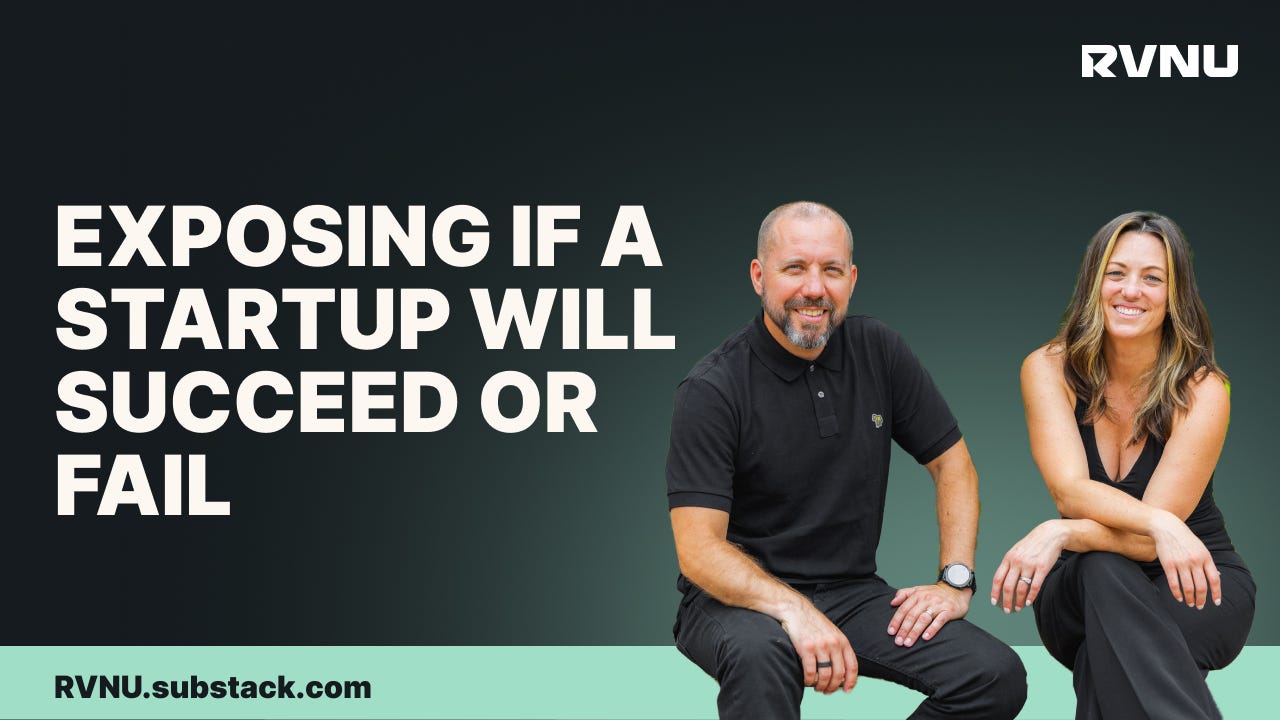RVNU #017: Exposing if a Startup Will Succeed or Fail
5 questions to disarm founders and uncover the reality.
Introduction
If you’re an account executive considering joining a startup, you’re not just evaluating the OTE (on-target earnings) and comp plan—you’re betting your career on your ability to sell the company’s product. That bet hinges on one key factor: whether the startup has achieved product-market fit (PMF).
Here’s the hard truth: many sales teams fail, not because they lack talent or hustle, but because the startup hasn’t done the foundational work to achieve PMF in a way that sets the sales team up for success. Without PMF, every demo feels like an uphill battle, every deal takes forever to close, and that OTE is a mere pipe dream.
This newsletter dives into the most common founder mistakes that we see at RVNU that undermine PMF, how to spot the warning signs, and how these pitfalls might impact your ability to sell effectively.
The Five Pitfalls That Set Sales Teams Up to Fail
1. Skipping Market Analysis Before Building the MVP
Founders who jump straight into building their product without understanding the market create an MVP that solves the wrong problems—or no real problems at all.
What to Ask the Founder:
“What specific unmet problem in the market does your product solve, and how do you know it matters?”
• Why it Matters: If the founder can’t clearly articulate the market gap their product fills, you’re walking into a company still trying to figure it out—a dangerous place to be as a salesperson.
2. Using Friends as Design Partners Without ICP Validation
Many founders lean on their network to gather early feedback, but friends often aren’t representative of the Ideal Customer Profile (ICP). This leads to a product designed for edge cases, not the broader market.
What to Ask the Founder:
“How did you identify your design partners, and are they paying for the product today?”
• Why it Matters: Design partners who aren’t willing to pay—or don’t match the ICP—are red flags. Selling a product built for the wrong audience will result in hours of frustration and tiny commission cheques.
3. Failing to Monitor Login and Usage Data by Persona
Early usage data is a critical signal of whether the product delivers value to its target users. If founders aren’t tracking this, they lack the insights needed to refine the product and support sales.
What to Ask the Founder:
“What does your data tell you about how different user personas interact with the product?”
• Why it Matters: If founders aren’t monitoring this, they’re likely flying blind. It’s hard to sell a product when no one knows how it’s actually being used.
4. Neglecting to Measure the $ Value of Early Customer Exchanges
Founders often celebrate their first few customers but fail to measure the ROI those customers are getting. Without this data, they’re guessing at the product’s value proposition.
What to Ask the Founder:
“What specific $ value are your customers seeing, and how do you measure it?”
• Why it Matters: If there’s no clear ROI story, your deals will stall or collapse under scrutiny.
5. Failing to Iterate the ICP or Pricing Strategy Based on Feedback
A founder who isn’t iterating based on customer feedback is likely stuck with an ill-defined ICP or misaligned pricing. Both can make deals harder to close.
What to Ask the Founder:
“What changes have you made to your ICP or pricing based on early customer feedback?”
• Why it Matters: If they haven’t iterated, expect resistance in the sales process. Customers won’t buy if they don’t see the value or if the price feels wrong.
How the RVNU Framework Exposes These Pitfalls
The RVNU framework focuses on de-risking revenue growth by guiding founders through the phases and stages of achieving a form of PMF that is optimal for the GTM org. Here’s how it addresses the pitfalls above:
1. Market Analysis (Stage 2): Ensures the MVP addresses a validated market need.
2. MVP Validation (Stage 4): Aligns early testing with true ICPs, not friends.
3. First Client Acquisition/Design Partners (Stage 5): Tracks persona-level usage to refine the product.
4. Proving Value Exchange (Stage 6): Quantifies the $ value being delivered to customers.
5. Iterating ICP and Pricing (Stage 7): Uses feedback loops to optimize the target market and pricing strategy.
Startups that skip these stages accumulate “GTM Debt,” which bogs down sales teams and undermines growth.
Conclusion
As an account executive, joining a startup without product-market fit is a risky move, I’ve unwittingly done it myself more than once, and seen many others do it - hence the creation of the RVNU framework. If you hear vague answers to the questions above or notice these pitfalls, it’s a sign the founder hasn’t done the work to set you up for success.
Sales is relatively straightforward when product-market fit is achieved. But without it, selling becomes a grind with low conversion rates, long sales cycles, and endless frustration.
When evaluating your next opportunity, ask the tough questions. The difference between success and struggle might just be whether the founder has truly achieved product-market fit.
Thanks for reading folks
Wayne



